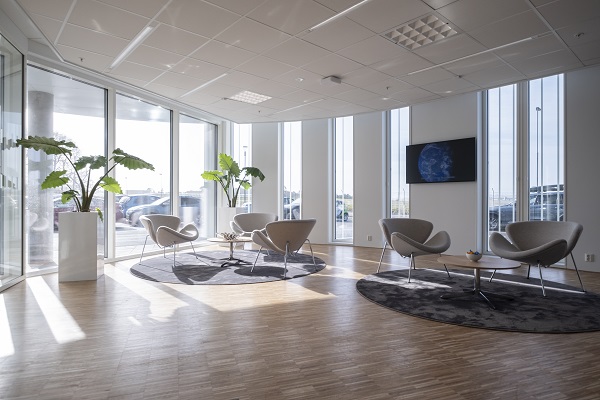Leveraging connected lighting technology from Signify and network expertise from Cisco, Norwegian IT systems integrator Atea has redefined the meaning of “smart office” with its office building in Stavanger, Norway. The office, named “living lab,” demonstrate the integration of connected technology on a single converged network.
Key to smart office capabilities at Atea is Interact Office from Signify — a suite of connected lighting monitoring and management software — and connected sensors and luminaires from Signify. In addition to high-quality, energy-efficient LED lighting and insights for businesses into performance and energy usage, the system offers personalization, productivity, and bio-adaptive lighting features that help keep employees happy and engaged.

(Image: Signify)
Atea wanted the newest technology available. New technologies within Interact include a personal control app for the lighting system, a highly accurate indoor location system that uses a combination of LED lighting and Cisco DNA Spaces, and even LiFi for light-based, high-bandwidth wireless connectivity.
Staffs at the offices can tailor the lighting levels and temperature according to their needs to create a suitable working environment. Furthermore, with bio-adaptive lighting installed in the atrium, employees can benefit from enhanced alertness, comfort, and productivity. Brighter, bluer light recipes in the morning can energize them, while softer, redder light recipes towards the end of the day can help them relax.
The system also optimizes the space usage by providing information of occupancy rates across the building. The indoor location system using visible light communication further create an indoor positioning feature for finding free working spaces and pinpointing the location of colleagues.
At Atea Stavanger, the connected lighting system is an integral component of the building’s IoT platform. Connected luminaires and their multi sensors transmit data via the IP network, which is deployed using Cisco Ethernet switches. Many of the building’s luminaires connect to the converged infrastructure using Power-over-Ethernet (PoE) —meaning these luminaires are powered and controlled through the Ethernet infrastructure, without the need for separate electrical wiring, and can easily transmit collected data to the cloud.












